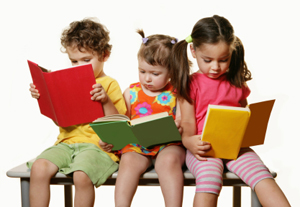Bridging the Literacy Gap in Westchester
by Miriam Kerness, Infant-Toddler Regional Coordinator,
Child Care Council of Westchester, Inc.
 The foundation for literacy skills is laid years before children enter school. A young child comes to his parent, child care provider, or other adult in her life, saying, “Will you read this?” What happens next is significant. For preschoolers, sharing books has been found to be one of the most significant factors in becoming successful readers and writers. 1 In fact, just engaging in turn-taking conversations-about the shared books, interests, or a child’s play-is beneficial. The number of different words children hear by age 3 is directly related to how well children can read at age nine. The foundation for literacy skills is laid years before children enter school. A young child comes to his parent, child care provider, or other adult in her life, saying, “Will you read this?” What happens next is significant. For preschoolers, sharing books has been found to be one of the most significant factors in becoming successful readers and writers. 1 In fact, just engaging in turn-taking conversations-about the shared books, interests, or a child’s play-is beneficial. The number of different words children hear by age 3 is directly related to how well children can read at age nine.
2 Many children from economically-disadvantaged households arrive at school already behind in communication and language, a disadvantage that only increases over time. 3 Research by Hart and Risley showed the vital connection between the number of words spoken to children and later academic performance. Children of families with fewer economic resources hear fewer words by age 3 – estimated to be in the millions. So a “performance gap” emerges early and begins to widen long before academics begin.
That’s why the Child Care Council of Westchester focuses on expanding early literacy opportunities for children and families - because what happens in the early years shapes a child’s life. The science is clear: 90% of brain development happens between ages 0-5. During these critical years, the interactions and experiences a child has shapes the brain- affecting the actual brain architecture, as well as success in school and in life. Early experiences set the stage for all future learning and literally spur on brain growth through the creation of neural connections. 4 The presence of high quality, diverse books in child care and after school programs help to create literacy-rich environments, which when coupled with caring adults, facilitates literacy skills and interest, motivates learning and sustains emotional well-being. In short: children can and do flourish.
1. Shonkoff, Jack P. and Phillips, Deborah A. (Eds.) (2000). From Neurons to Neighborhoods: The Science of Early Childhood Development. Washington, D.C. National Academy Press
2. Teale, W.H. (1987) Emergent literacy: Reading and writing development in early childhood. In E. Readance and R.S. Baldwin (Eds.) Research in literacy: Merging Perspectives (pp. 45-74). Rochester, NY: National Reading Council
3. LEAF-Literacy Empowers All Families
4. Hart, B. and Risley, T.R. (1999). The Social World of Children Learning to Talk. Baltimore: Paul H. Brookes
|

